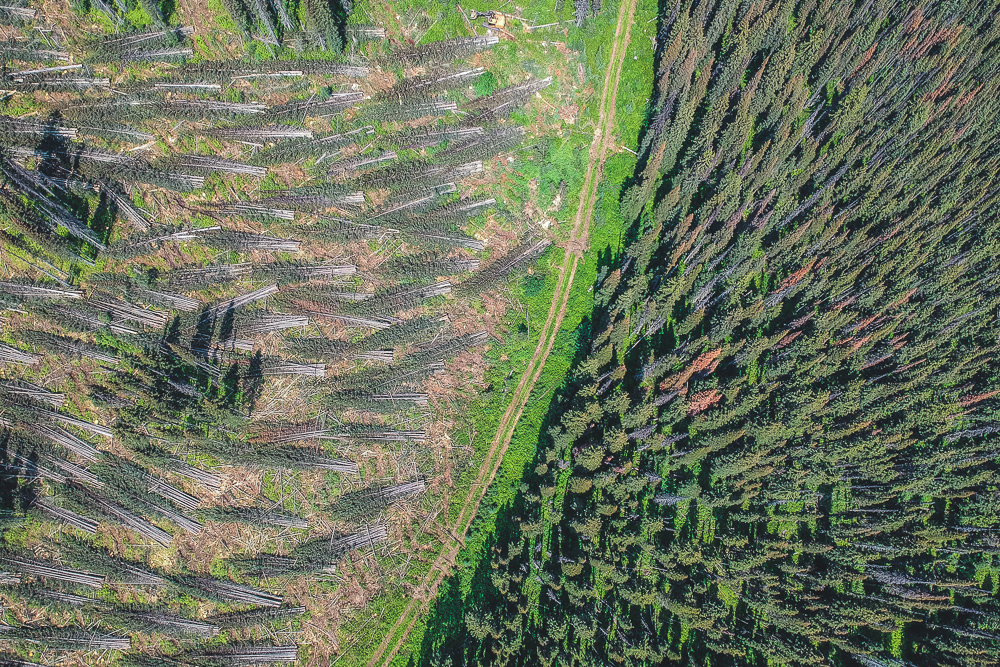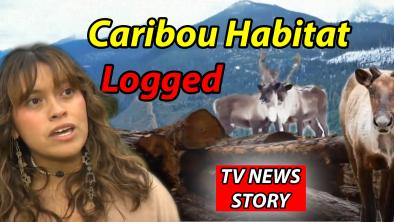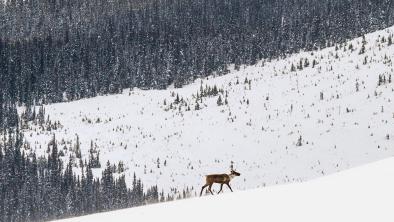B.C. approves 314 new cutblocks in endangered caribou habitat over last five months
The Narwhal

As more caribou populations flicker out, and pressure mounts on the province to protect the species’ habitat, logging approvals have almost quadrupled since mid-October
The B.C. government approved 314 new logging cutblocks in the critical habitat of southern mountain caribou over the past five months, while simultaneously negotiating conservation plans to protect the highly endangered species, according to maps released Thursday by the Wilderness Committee.
The new cutblocks cover almost 16,000 hectares in total, an area almost eight times the size of the city of Victoria.
The Wilderness Committee discovered a sharp spike in logging approvals in the critical habitat of B.C.’s eight most imperilled caribou herds, where last October the group documented an additional 83 new cutblocks covering an area the equivalent of 11 Stanley Parks in size.
“On the one hand B.C. says it’s protecting caribou while on the other they’re handing out permits to log habitat as fast as they can,” said Charlotte Dawe, the Wilderness Committee’s conservation and policy campaigner.
“It’s as if the B.C. government is holding a clear out sale for logging companies to ‘get it while you can!’ It’s the great caribou con from our very own B.C. government.”
Click here for of approved cutblocks in caribou habitat in BC.
Almost 30 of B.C.’s 52 surviving caribou herds are at risk of local extinction, and a dozen of those herds now have fewer than 25 animals. Two herds in the Kootenay region were declared locally extinct early this year.
New cutblocks prompt calls for federal intervention
Dawe told The Narwhal that the 314 new cutblocks should be “the last bit of evidence that the federal government needs to jump in and issue an emergency protection order for the caribou herds in B.C.”
Last May, federal Environment Minister Catherine McKenna singled out the eight most at-risk B.C. herds now facing increased logging in their critical habitat when she declared that southern mountain caribou faced “imminent threats” to their recovery and said immediate intervention was required.
Those herds, found mainly along the province’s eastern border, include the Quintette, Kinbasket, Narraway and South Monashee populations.
Wilderness Committee documented 134 new approved cutblocks in the critical habitat of those eight herds from mid-October to the end of February.
At last count, the Quintette herd had only 74 individuals left – down from about 100 animals in 2015 — while only 26 caribou remain in the South Narraway subgroup of the Narraway herd. Just nine caribou were counted in 2017 in the Bearhole-Redwillow subgroup of the Narraway herd, down from 17 animals in 2015.
If McKenna is not satisfied that B.C. has a suitable plan of action to protect endangered herds, she can ask the federal Cabinet to approve an emergency protection order under the federal Species at Risk Act.
That would allow Ottawa to make decisions that are normally within the jurisdiction of the B.C. government, including whether or not to grant logging permits.
“The provincial government is clearly failing,” Dawe said. “It’s clear that they’re playing two sides. They want to appear that they’re negotiating in good faith. But they also don’t want to stop industry from logging what’s left of critical habitat.”
“While industry has been pushing back, government has been giving in.”
Dawe said she thought the B.C. government would take a step back and pause logging approvals following the two recent local extinctions and in light of ongoing negotiations with the federal government — in collaboration with directly affected First Nations — to reach a conservation agreement for southern mountain caribou recovery.
The B.C. government is also in the throes of negotiating a partnership agreement with the federal government and the West Moberly and Saulteau First Nations in the Peace region to develop conservation and recovery measures for the central group of southern mountain caribou, which includes the Quintette and Narraway populations.
Logging approved in critical habitat of 17 herds
New logging has been approved in the critical habitat of 17 local caribou populations in total, including the Central Kootenay, Hart, Quesnel and Wells Gray-Thompson herds, according to the Wilderness Committee.
The Wilderness Committee’s latest maps show the highest number of recent logging approvals in the Telkwa and Chilcotin caribou population, where the B.C. government gave the go-ahead to 13 new cutblocks in the core critical habitat of each herd.
The Telkwa herd’s critical habitat is northeast of Smithers, while the Chilcotin herd’s critical habitat is east of Bella Coola.
The maps cover the time frame from October 19 to February 28 and use the federal government’s definition of critical habitat.
Doug Donaldson, minister of forests, lands and natural resource operations, told The Narwhal in October that his government has been “working hard” on the caribou issue since the federal government highlighted new concerns in May.
“We’re very concerned about an iconic species in B.C.,” Donaldson said. “We want to see caribou not just survive but recover.”
But Greenpeace senior campaigner Eduardo Sousa said the B.C. government would have rejected the new cutblocks if it were serious about protecting and recovering caribou.
“Instead, by approving these blocks, they are negotiating conservation agreements in some of these very same areas in bad faith,” said Sousa, who called the new logging approvals “appalling.”
Last year, scientists roundly criticized a “resource document” produced by Donaldson’s ministry as part of the caribou recovery program, described by the government as a “new, made in B.C.” initiative even though recovery strategies already exist to save the critically endangered species.
“We fear that intentions to develop a ‘made in B.C.’ approach will amount to much wasted time, even as decisions are underway to degrade more prime caribou habitat,” scientists Justina Ray and scientist Chris Johnson wrote in a six-page letter to Donaldson’s ministry.
The ministry was not able to respond to questions from The Narwhal by our deadline.


